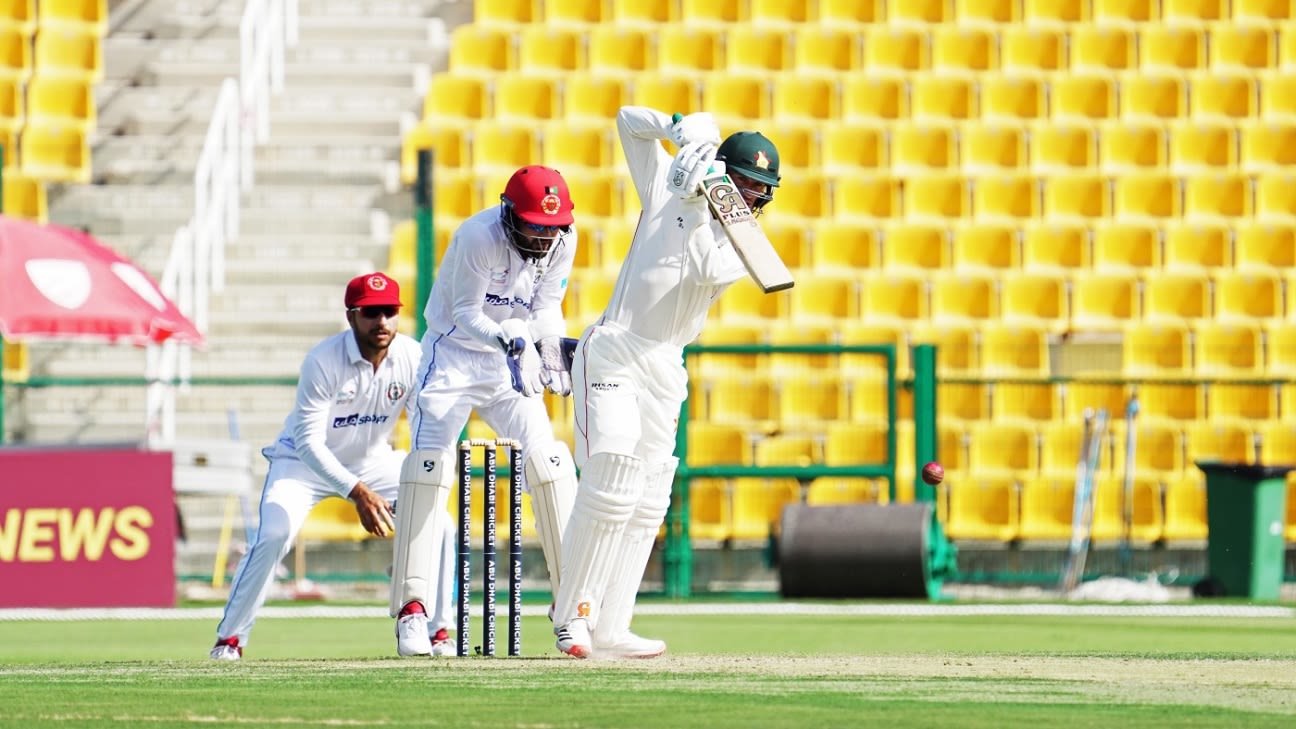
Zimbabwe's captain Sean Williams hailed his side's ten-wicket win over Afghanistan in the first Test in Abu Dhabi as a coming-of-age performance from a young group of players, and particularly important for his fledgling captaincy. Three Tests into his captaincy, Williams has lost once, and averages 80.50 with two hundreds and a fifty, and is enjoying the additional responsibility.
"To win a Test match in two days with a young side is an extremely big feat for us as a team," Williams said. "And for me it's huge. As I have got older and taken on more responsibility as captain and a senior player, I started to understand more about my own game and leadership skills, and how important my performance is through tough times. As a leader, you can't show weakness, You need to be strong. That's a big thing for me. I've had it tough, I've had it rough and I've just kept on pushing. I feel like I didn't come this far, to just go this far."
Williams was handed over the captaincy early last year, and his first assignment was a home series against Sri Lanka. After Zimbabwe were beaten by ten wickets in the first Test in Harare, he scored 107 and 53* in the second fixture that helped them post 406 in the second Test and set Sri Lanka 361 to win though eventually the match was drawn. In Abu Dhabi, Williams' 105 rescued Zimbabwe from 38 for 4, helping post a match-winning 250 in their first innings on a tricky pitch.
He described it as a "carpet on one side and a dustbowl on the other", and acknowledged it was a good toss to lose because he would have batted first as well, like Asghar Afghan did. There was plenty in the surface and through the air for Zimbabwe's seamers, as Blessing Muzarabani and Victor Nyauchi made a successful new-ball pair that Williams hopes will continue to operate together in future. "When you have Blessing on one end and Victor on the other end, it's not going to be easy," he said.
He singled out Nyauchi, who had made his debut in Williams' first Test as captain after finishing second in Zimbabwe's first-class competition in two out of the last three seasons, as being particularly deserving of the opportunity for a long run at the international stage. "He is something special for us," Williams said. "He came from a difficult place in that he performed for three or four seasons without getting a look into the national side. He is a work horse. He has got good skill and his skills are developing."
Nyauchi finished the Test with six wickets - and Zimbabwe's seamers with 16 between them - justifying the team selection to go without a specialist spinner. Afghanistan went the other way, with only one frontline pace bowler and three spinners. And though turn was evident from the first day, apart from Amir Hamza, they did not have a significant enough say in the Test. Had there been more overs for each side to face and more days in the match, that might have changed. Also, Williams noted that the pitch seemed to be getting slower, especially against the older ball, which meant batting would have become more difficult.
Even in the two days that were played, patience was key to run-scoring and it was in short supply across both sides. Afghanistan's line-up played at many balls they could have left - especially in the first innings - and were loose in defence. And Williams thinks it is the mental - and not the technical - aspects of the game they need more practice in.
"It's pressure. When you've got that many debutants (Afghanistan had three while Zimbabwe one) and you lose quick wickets, it's pressure," Williams said. "Afghanistan are a very strong white-ball team, and we saw a lot of nick offs (nine out of 20). There are certain disciplines in Test cricket that you can get away with not having in ODI cricket because the slip cordon is not there. So It's a mental battle. It's almost like a war going in your mind when you're out there. Once you can learn to go and control that, you will be ready for Test cricket."
Zimbabwe's only newcomer, Wesley Madhevere, had a maiden Test to forget and was dismissed for a first-ball duck. But Williams heaped praise on him as well as Tarisai Musakanda, who was returning to the side for the first time since 2017, for their efforts in the field and behind the scenes. Musakanda took a good catch at gully to dismiss Ibrahim Zadran in the first innings and Madhevere took a diving grab at deep square leg to get rid of Hasmatullah Shahidi.
"They bring a lot to this team," Williams said. "Tari has got speed, talent and he is an excellent fielder. So is Wesley. The catch he took set the tone for the rest of the innings. They are young. They are full of beans in the change room. They bring support, energy and enjoyment. They bring a lot."
Crucially, they also point to depth in the Zimbabwean set-up, which is much needed in the absence of several senior players like Brendan Taylor, Craig Ervine and Kyle Jarvis who are sitting out of the tour with illness, and Tendai Chatara, Chamu Chibhabha and PJ Moor, who are absent through injury, thus forcing Zimbabwe to find new heroes. Williams hopes that process is now well underway.
"For the future this win is huge," he said, while also cautioning his men not to get too carried with what is just a single win. "It's important that we stay humble. There is still another Test to go."
Firdose Moonda is ESPNcricinfo's South Africa correspondent















 Phone: (800) 737. 6040
Phone: (800) 737. 6040 Fax: (800) 825 5558
Fax: (800) 825 5558 Website:
Website:  Email:
Email: 






